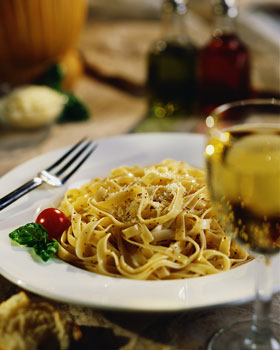Eating in Italy
a personal perspective from Camilla Helgesson Italy is all about variety and choice. The fact that it is a relatively 'new' nation means that its cuisine is extremely diverse, and enchanting regional characteristics are more enhanced. At the same time, however, there are unwritten 'rules' that everyone follows.
Italy is all about variety and choice. The fact that it is a relatively 'new' nation means that its cuisine is extremely diverse, and enchanting regional characteristics are more enhanced. At the same time, however, there are unwritten 'rules' that everyone follows.Nowhere is this more evident than when we talk about food.
It can be confusing, as the Italian kitchen is defined as l’arte della semplicità, or 'the art of simplicity'. But as a foreigner it may, at first, not feel as if things are simple, as the approach to food is patriotic, regional and complicated by many rules and factors.
Rules (to be broken)
For starters, either you can buy freshly produced asparagus or you can’t. Either you can buy fresh oranges, or you can’t. If it’s not the season for an ingredient, it will be close to impossible to find it, as Italians only believe in fresh, seasonal, locally produced and harvested fruits and vegetables. You don’t put cheese on your seafood dish. The pasta has to be al dente. You don’t eat your salad before the pasta. Each sauce has its 'own' dedicated pasta shape. There is the right way to have your espresso served in the bar.
Where I come from (Sweden) you usually put everything you are about to eat on the same plate - the meat, the potatoes, the gravy and the extras. In Italy, it all comes separate. In the restaurant you decide to go for the fish, then you decide what will be on the side - potatoes or eggplants or vegetables - everything on separate plates and rarely you’ll get any gravy. You may end up eating from four or five plates at the same time.
The best of local
The regions have a big influence on the kitchen, too. If you go south towards Naples, Italians make the extra effort to stop and buy the freshly produced Mozzarella, in its own region, and then take it along either to the beach or back home. Pizza is best in Naples, the lemons in Capri, the ham from Parma, the Parmesan cheese from the north region of Reggio-Emilia. Each region has its own specialty, and they take great pride in it.
Food in Italy is a ceremony and something that unites families and friends. In other countries you may go out together for a drink - here you go out for the sole purpose of enjoying a good meal together. Food here is a passion. I have Italian friends who can drive 30km just to enjoy the best ice cream available. Don’t be surprised to overhear a conversation between construction builders on their break about how to prepare the best tomato sauce.
Cuisine as a door to culture
I arrived in Italy in 2005 and quite soon realised that Italians have a unique relationship to food that I doubt you will find elsewhere. Italians approach food as religion. Italian food is a combination of the best ingredients possible, how you prepare them, your attitude to the food and how you eat it. To come to know Italian food and how to talk about it will be like a door to the culture of this country and its soul, and it will leave you transformed.Are you an expat living in Italy?
Expat Arrivals is looking for locals to contribute to this guide, and answer forum questions from others planning their move to Italy. Please contact us if you'd like to contribute.
Expat Health Insurance
Cigna Global Health Insurance.
Medical insurance specifically designed for expats. With Cigna, you won't have to rely on foreign public health care systems, which may not meet your needs. Cigna allows you to speak to a doctor on demand, for consultations or instant advice, wherever you are in the world. They also offer full cancer care across all levels of cover, and settle the cost of treatments directly with the provider.
Moving Internationally?
International Movers. Get Quotes. Compare Prices.
Sirelo has a network of more than 500 international removal companies that can move your furniture and possessions to your new home. By filling in a form, you’ll get up to 5 quotes from recommended movers. This service is free of charge and will help you select an international moving company that suits your needs and budget.
Get your free no-obligation quotes from select removal companies now!


